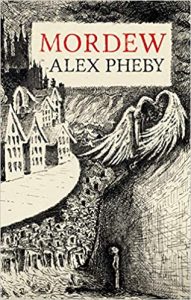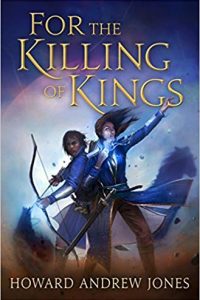Ian Mond Reviews Mordew by Alex Pheby
 Mordew, Alex Pheby (Galley Beggar Press 978-1-913-11102-1, £14.99, 604pp, tp) August 2020.
Mordew, Alex Pheby (Galley Beggar Press 978-1-913-11102-1, £14.99, 604pp, tp) August 2020.
I’ve been eagerly awaiting Alex Pheby’s Mordew – the first volume in a new epic fantasy trilogy – since publisher Galley Beggar Press announced it more than a year ago. (If you have the spare cash, I highly recommend subscribing to Galley Beggar Press, one of the best small press publishers who produce gorgeous, award-winning books.) I loved Pheby’s previous novel, Lucia, a literary biography about James Joyce’s daughter and the deserved winner of the Republic of Consciousness Prize (alongside the terrific Murmur by Will Eaves). It’s a non-linear work, a stunning act of speculation that takes the few facts we have about Lucia and imagines a life that’s positive – she was an incredible dancer – negative – she was tormented by men (especially her father) – and tragic – she suffered from schizophrenia and spent her last three decades in an asylum. Pheby brings that same imagination to the titular city of Mordew, a world of Living Mud, Demigods, and magical artifacts, reminiscent of China Miéville’s Bas Lag and M. John Harrison’s Viriconium.
Before we set foot into Mordew, we’re informed on the opening page that a glossary is available if we become confused “by all the unfamiliar things.” This advice comes with the warning that “some entries contain information unknown to the protagonist” and that “perhaps the ideal reader of Mordew is one who understands that they, like Nathan Treeves (its hero), are not possessed of all knowledge of all things at all times.” Remarkably, this is then followed by a Dramatis Personae that seems to go out of its way to spoil the rest of the book by providing brief, but detailed, descriptions of each character and then a list of the numerous “unusual things” we will encounter: everything from “a cloud of bats made from diamonds” to “some friendly fish” to “magical jewellery worn inside the chambers of a boy’s heart.” This catalogue of the strange and bizarre reminded me of the opening titles of Space 1999 (Season One) where they would flash scenes from the upcoming episode, or, if you want a contemporary analogue, Hannah Gadsby’s most recent Netflix comedy special (Douglas) where she outlines her entire act in the opening minutes of the show. Suffice it to say, unless you have an eidetic memory, by the time you’ve read the first hundred pages you’ve entirely forgotten all you’ve been told.
The playful, subversive tone of the opening pages does carry over to the main story, though it’s not immediately evident. Initially, we’re presented with a Dickensian take on the Chosen One trope: our hero is young (Nathan Treeves is barely a teenager), lives in poverty, is unaware of his family’s aristocratic pedigree, and is imbued with magic – an Itch – that not only marks him out from everyone he encounters, but is akin to the power of a God. Like Harry Potter, Luke Skywalker, and Katniss Everdeen before him, there is an expectation that Nathan will undergo training – where his raw skills will be harnessed – so he can face off against the main villain. Pheby, though, has no interest in following that familiar arc. Cramming in a trilogy’s worth of plot, Nathan joins a gang and becomes a decent thief; goes on a sea-voyage to confront the evil Mistress of Malarkoi; starts a revolution; is involved in a prison break-out; uncovers the corpse of God; and meets a talking dog named Anaximander (by far Mordew‘s best character, who deserves an ongoing series on Netflix). When Nathan does undergo training, taken under the wing of the Master of Mordew whose imposing Manse looks over the city, his education has less to do with taming his Itch and more to do with the fact he has never learnt to read. It’s refreshing to be introduced to a poor or working-class hero who doesn’t have the middle-class book smarts and curiosity of an iconoclast. But maybe the most significant difference, when compared to the conventional Chosen One arc, is that Nathan never truly enjoys a moment of agency. From early on in the piece when he joins Gam Halliday’s gang, to the period when he trains to be the Master’s apprentice, to his decision to free the “clever and mischievous” Dashini from her “Quarantine,” he is acting on someone else’s behalf. Again, this is recognition that Nathan, who has experienced a life of privation and hardship, isn’t equipped to make the sort of moral and principled choices expected of a Hero.
As promised, following an unexpected and shocking climax (no spoilers – but wow!) there is a Glossary. This is no three-page affair. In the mould of Tolkien, Herbert, and Dungeons & Dragons sourcebooks, it’s a novella-length deep dive into Pheby’s world-building. The Glossary explains where Mordew is located (fascinating), provides biographical details on the Masters and Mistresses (intriguing) and, with references to “the Assembly” and the “Seventh Atheistic Crusade,” provides a hint of where the trilogy may be headed (exciting). A good deal of the Glossary, including several short essays, also provides insight into the Platonic/Kabbalistic cosmogony of Mordew. But the best bits are entries where the omniscient narrator’s snarky personality peeks through: “Repetition est pater studiorum: Words that say ‘practice makes perfect’ in a dead language found in old books. Probably true, in sentiment, but tedious in practice.” It’s Pheby’s cheeky sense of humour that adds a final touch to what’s an incredible opening to an exciting new epic fantasy trilogy.
This review and more like it in the September 2020 issue of Locus.
 While you are here, please take a moment to support Locus with a one-time or recurring donation. We rely on reader donations to keep the magazine and site going, and would like to keep the site paywall free, but WE NEED YOUR FINANCIAL SUPPORT to continue quality coverage of the science fiction and fantasy field.
While you are here, please take a moment to support Locus with a one-time or recurring donation. We rely on reader donations to keep the magazine and site going, and would like to keep the site paywall free, but WE NEED YOUR FINANCIAL SUPPORT to continue quality coverage of the science fiction and fantasy field.
©Locus Magazine. Copyrighted material may not be republished without permission of LSFF.









It’s “mater studiorum”. And if someone thinks “repetition” is proper Latin, then this bodes not well either for the author, the proofreader, or the reviewer…
It’s “repetitio” in the book, and the Master’s manse, where the phrase is used, is a misogynistic patriarchy where women are banned. “Mater” is replaced, by an ideologue of this patriarchy, with “pater” and “repetitio est mater studiorum” consequently doesn’t appear in the text.
Moreover, the glossary is written “in universe” and is not a reliable source.